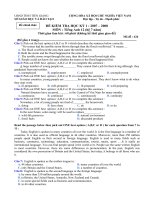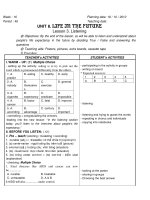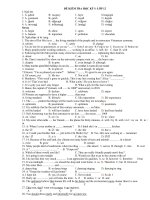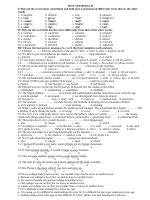- Trang chủ >>
- Lớp 11 >>
- Giáo dục công dân
anh van 12
Bạn đang xem bản rút gọn của tài liệu. Xem và tải ngay bản đầy đủ của tài liệu tại đây (44.71 KB, 3 trang )
<span class='text_page_counter'>(1)</span>TOPIC. GERUNDS. DANH ĐỘNG TỪ : (Gerund) Danh động từ có cấu trúc giống như hiện tại phân từ ( tức là động từ thêm ING) : talking, learning, cutting, lying… Danh động từ, như tên gọi, là động từ dùng như danh từ. Danh động từ chủ yếu đứng ở vị trí, và thực hiện chức năng, của một danh từ trong câu. Nó thường được : 1/ Dùng làm chủ từ : (subject) - Swimming is good for our health.. - Being friendly will bring you friends.. 2/ Dùng làm túc từ cho động từ : (object of a verb) - These boys like swimming. - My brother practises speaking English every day. 3/ Dùng làm bổ ngữ cho chủ từ : (subject complement) - My hobby is swimming. - Seeing is believing. 4/ Dùng làm túc từ cho giới từ : (object of a preposition) - He is fond of swimming. - She is interested in learning English. 5/ Dùng trong câu ngăn cấm ngắn (short prohibition) hoặc để thành lập danh từ kép (compound noun) - No smoking. - No talking, please. - a swimming pool. - a dining room. a washing machine. 6/ Dùng sau tính từ sở hữu : - Please forgive my coming late.. - His driving carelessly often causes accidents.. 7/ Dùng sau một số động từ và một số cách diễn đạt nhất định như : admit, advise, avoid, consider, delay, deny, dislike, enjoy, finish, hate, keep, like, mind, practise, postpone, quit, risk, suggest, can’t help, can’t bear, can’t stand, be worth, be busy, it’s no use, there’s no… - We enjoy listening to music. - I can’t help laughing when she makes jokes. + Chú ý : Một số động từ có thể theo sau bởi danh động từ hoặc động từ nguyên mẫu nhưng có sự khaùc bieät veà nghóa trong caâu. (*) Remember + gerund : nhớ lại việc đã thực hiện. - I remember posting the letter. Remember + to infinitive : nhớ để thực hiện. - I remember to post the letter. (*) Stop + gerund : ngưng thực hiện việc đang làm. - She stopped mending the dress. Stop + to infinitive : ngưng làm một việc gì khác để làm việc này..
<span class='text_page_counter'>(2)</span> - He stopped to have a drink. (*) Try + gerund : thử làm việc gì . - I try writing in blue ink to see if my handwriting is better. Try + to infinitive : coá gaéng laøm vieäc gì. - They tried to work as hard as they could. (*) Mean + gerund : mang yù nghóa. - Failure in the exam means having to learn one more year. Mean + to infinitive : dự định làm việc gì. - He means to take the coming exam. (*) Forget + gerund : quên điều gì đã xảy ra. - I forgot telling her this story. Forget + to infinitive : queân laøm ñieàu gì. - I forgot to tell her about this. (*) Regret + gerund : hối tiếc việc đã xảy ra. - She regrets going to a village school. Regret + to infinitive : hoái tieác seõ laøm vieäc gì. - The party was great. He regretted not to go there. EXERCISE I : Supply the correct form of the verbs : 1/ I couldn’t stand (be) ____ alone in the dark room. 2/ You must remember (lock) _________ the door before (leave) _________ the house. 3/ After (get) _________ (know) _________ her at school, he finished by (ask) _________ her address. EXERCISE II : Use the correct verb form : 1/ The children are busy (collect) _________ shells on the beach. 2/ We regret (say) _________ that the lecture was dull and wasn’t worth (listen) _________ to. 3/ There’s no point (deny) _________ that he enjoys (listen) _________ to his own voice. 4/ It’s no use your (ask) _________ him to lend you any money. 5/ They refused to allow us to go in without (sign) _______ the book. 6/ There’s nothing like (walk) _________ as a means of (keep) _________ fit. 7/ Your doctor advised (go) ____ to bed early, so I really can’t understand your (want) ____ to stay up late. 8/ We considered (give) ______her a dress for her birthday, but couldn’t help (buy) _____her some flowers, too. 9/ There’s nothing (be) _________ done about it now except (tell) _________ the police the truth. 10/ I remember (hear) ________ him (say) ________ the grass needed (cut) _______. 11/ Would you mind (keep) _________ quiet for a moment ? I’m trying (fill) _________ in a form. - It’s no use (ask) _________ children (keep) _________ quiet. They can’t help (make) _________ noise. 12/ The miser spent all his time (count) _____ his money and (think) ______ up new hiding places. He kept (move) ______ it about because he was terrified of (be) _____ robbed. He used to (get) ____ up at night (make) ____ sure it was still there. 13/ They don’t allow (smoke) _________ in the auditorium; they don’t want (risk) _________ (set) _________ it on fire..
<span class='text_page_counter'>(3)</span> 14/ Would you like me to turn down the radio a bit ? - No, it’s all right. I’m used to (work) ____with the radio on. 15/ We couldn’t help (laugh) ________ when he was making fun of himself. EXERCISE III : Rewrite the following sentences. 1/ Would you close the door, please ? - Would you mind _________________________________ ?. 2/ He has studied English for six years. - He began ______________________________________. 3/ It is necessary to master English. - Mastering ________________________________________. 4/ He expects to hear from her as soon as possible. - He is looking forward___________________________________..
<span class='text_page_counter'>(4)</span>









